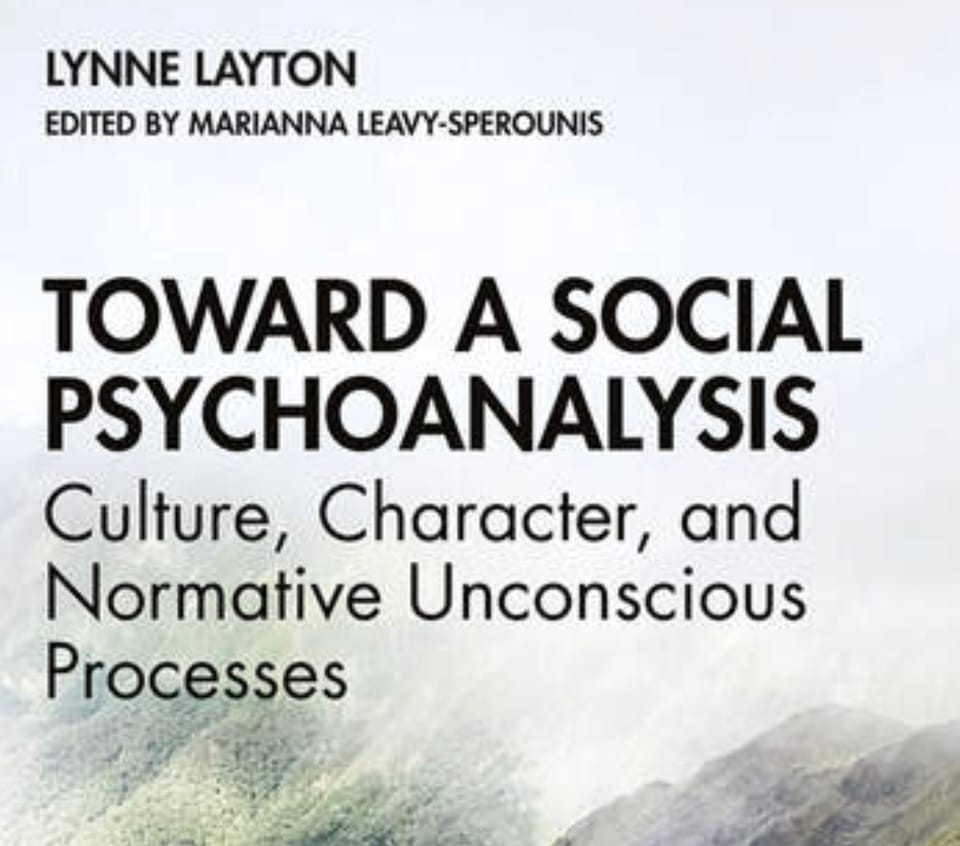Social Narcissism

Our current social conditions of increasing income inequality, downsizing, outsourcing, high unemployment---extremely high in some groups---and generally precarious feelings about the economic situation have created much anxiety about class status and well-being in all classes. This has led, on the one hand, to split states of immense vulnerability and insecurity, and on the other, to public hatred of any signs of vulnerability and dependency. Dependency has come to signify “poor” and “failure.” (Layton, 'Yale, fail, jail' 2020)
For a reading group with some friends I read a chapter from Lynne Layton's recent book Toward a Social Psychoanalysis. Layton is an Assistant Clinical Professor of Psychology at the Harvard Medical School. She argues that the social inequalities realised by neoliberalism lead to a condition she calls 'social narcissism'.
The hallmark of social narcissism is the perverse tendency of people to experience their own fate as entirely separate from the fate of other people, and to protect aggressively a fantasy of self-independence.
Neoliberal culture
Layton's description of neoliberalism focuses on the United States, but I think that much of what she writes can be applied with little modification to many European countries. Neoliberalism is best understood as a political-cultural system. As a reaction to the post-war welfare projects, capitalists managed to convince (or bribe) those in government that government should primarily be concerned with protecting the market. Citizenship under neoliberalism becomes about consumption and self-care. In the end, all problems are problems for individuals---there is no place for genuinely social problems in the culture of neoliberalism.
Frighteningly, by now people have completely internalised this. Good citizens are thought of as those that contribute to the economy and take responsibility for their own fate and well-being. Accordingly, social values that once defined maturity and adulthood---such as dignity in work, family, or class solidarity---no longer matter. Jennifer Silva interviewed people about what they took to be marks of success, and found that they understood maturity and individual growth not in terms of relations with others, but rather in terms of self-care, and the ability to overcome hardship or addiction without relying on support from others. "In compliance with neoliberal dictates," Layton writes, "they largely separated their psychological selves from any connection with social conditions."
Omnipotence and projective identification
These shifts can in part be explained by an anxiety people have come to feel when confronted with their own vulnerability. Vulnerability and dependency have in the neoliberalist culture Layton describes come to signify something bad; something to be ashamed of and to avoid. Economically, we can understand this in terms of a cost-benefit analysis: to be dependent is to be needy, and needy people are bad for the economy, and hence bad people full stop. (Layton's observation ties in with Adler-Bolton and Vierkant's discussion in Health Communism, about which I wrote earlier.)
Psychologically, however, to repudiate dependence encourages a fantasy of omnipotence. The omnipotent mind idealises itself. It imagines that it needs nobody and nothing. Of course, this is setting yourself up for failure. People always already depend on others, need others. Sooner or later this fantasy of omnipotence and invulnerability will be threatened, either by things that happen to you or by things you see happen to others just like you.
Layton describes how, to deal with such threats, neoliberal subjectivity has adopted a narcissistic set of defences. On the one hand, those people that can, will idealise and identify with those who seem most independent: those that have most money. By doing so, they distance themselves from those who are vulnerable. On the other hand, people will try to deny their own vulnerability by responding aggressively to those who seem most dependent and vulnerable---a defensive reaction psychoanalysts call projective identification. The cultural normalisation of this defensive structure is what Layton calls social narcissism.
Wealth and health
In my essays on health supremacy I tried to articulate a similar dynamic, although I did not venture to articulate the psychology of it. I did also not characterise the current ideal citizen in terms of wealth, but in terms of health. 'Healthy people are better people,' that's the core of the health supremacist ideology. But in a society where care is increasingly the privilege of those that can afford it, the connection between health and wealth is of course all too easy to establish.
I think that Layton's work on social narcissism helps us to construe the psychological dynamics that underpin the social divisions we see in today's society. The concept of projective identification can perhaps help us understand why so much aggression is directed at those who remind us that everyone is vulnerable and dependent.